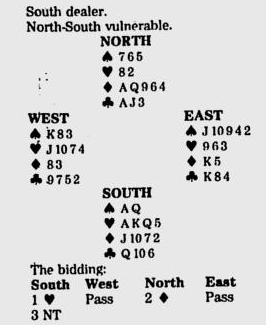Gainesville Sun – 12 Mar 1986

Opening lead — two of clubs
Experience shows that when a side has 26 points or more, a game can nearly always be made. But mere possession of these points doesn’t mean the game is awarded to the side that has them. There is first the question of bidding the game, and there is the question of how declarer plays the cards. Take this deal where South mis managed his assets. West led a club and declarer followed low from dummy, losing the finesse to East, king.
Back came the Jack of spades, the queen losing to the king, and a spade continuation drove out the ace. When declarer then tried his third finesse — this time in diamonds —East won and cashed his spades to put South down two.
The hand shows how easy it is to fall a victim to habit. It is decidedly tempting to finesse West’s club lead, but declarer should rise with the ace more quickly than he can say Rumpelstiltskin.
Taking the ace assures the contract, while taking the finesse jeopardizes it. The finesse should therefore be rejected.
If South were dealing only with the problem of winning the maximum number of club tricks, he would of course finesse. But that is not his problem. He is trying to make three notrump, and he should not permit himself to be diverted from that by the opportunity to finesse.
He should take the ace of clubs, play a heart to the ace, lead the jack of diamonds and finesse. If it loses, South has nine tricks. If it wins, there are at least ten tricks. He should not concern himself with the location of the king of clubs. The 30 points he may theoretically gain by a club finesse are a drop in the bucket compared to the value of making a game.


